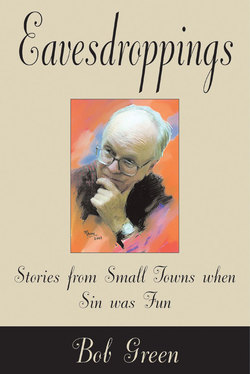Читать книгу Eavesdroppings - Bob Green - Страница 29
На сайте Литреса книга снята с продажи.
Оглавление21 George Recalls Scott’s Opera House
When George Brown’s violin was in for repair, he found peace and diversion at Scott’s Opera House. The flaking brown playbills of Scott’s Opera House in the archives at Galt City Hall reveal there was indeed entertainment before television. Dated from 1903 to 1918, the playbills are loaded with famous stage names that make one swoon with nostalgia. Who can forget Mortimer Ellingham, Adelaide Eaton Colton, and Lonnie Lorrimer Deanne? And how about Mack Sennett, Bessie Smith, Billie Burke, and Sophie Tucker? Mack Sennett played a minor role in the musical comedy Wang, but later became Hollywood’s king of slapstick and creator of the Keystone Kops.
George says he went to the movies whenever he wasn’t playing hockey. He saw his first movie at Scott’s. It was called Wings, not quite silent because a man behind the screen reproduced the sound of airplanes with a vacuum cleaner. George played goal in a tough intercounty league and once punched out Howie Meeker, which was directly responsible for Meeker’s lifelong crusade against violence on the ice. But that’s another story.
Maude Adams, the leading lady in American theatre, played Scott’s in the role she immortalized in Peter Pan, flying over the audience suspended in a harness hooked to an intricate network of wires. Special effects rivalled anything you might see onstage today. After the performance of Queen Zephra in 1903, the stage was showered with 40,000 yards of serpentine confetti of every colour.
And there was suspense. A note in heavy type on the playbill of That Imprudent Young Couple warns: “Owing to the very unusual and unconventional ending of the third act, it is desirous that the audience remain seated until the descent of the curtain.” Management didn’t want a riot. The titles of many of the productions, not yet controversial in 1903, would surely cause homophobes to picket with bullhorns today: The Gay Mr. Goldstein, The Gay Musician, The Fairies of Ireland, When Women Love, and Mutt and Jeff’s Wedding. Scott’s was way ahead of its time.
Playbill advertisements for local businesses didn’t waste words: “Smith Can Press Your Clothes Right.” This ad appeared unchanged from 1903 to 1908 when Smith disappeared. The Imperial Hotel on Water Street rented rooms for $1.50 to $2 a day and offered “free sample rooms,” possibly code for something that led to the hotel burning down.
Stage equipment suppliers advertised their wares, too. A note in the playbill for Over Niagara Falls in all versions A, B, and C reads: “Boats supplied by King Folding Canvas Boat Co. of Kalamazoo, Mich.” Another ad reads: “Pistols used in Within the Law supplied by Maxim Silent Firearms Co. of Hartford, Conn.” The whole back page of a 1904 playbill carries an invitation for anyone who can make it to the wedding of Mary Ellen Carruthers and James Robertson and the reception in Glen Morris, June 1, Wednesday at 1:00 p.m. For every performance of Ten Nights in a Bar Room, a lucky ticket holder won a ton of coal.
The variety of entertainment was unlimited. Right after the great Ed Hoyt (who can forget Ed?) did Hamlet, Joseph Sheehan, America’s greatest tenor, starred in Salome with a cast of fifty. Next came the Tzigani Troupe of acrobats accompanied by “the world’s greatest singing chorus.” Clarence Bennett, as Native chief Tabywana in The Squawman, spoke entirely in the Ute language under the tutelage of Baco White of the Ute reservation. The audience, until informed of this, just thought he had a speech impediment. The renowned hypnotist Sevengala carried a special note in his program: “Persons who cannot be hypnotized … idiots and lunatics (except in special cases), children under the age of three and persons under the influence of alcohol.” It had to do with their attention span.
Local talent performed at Scott’s, too. The YMCA annually staged a Grand Gymnastic Exhibition, including stunts on a real horse, a ladies’ physical culture and Morris dancing demonstration, and Sebastapol playing on a guitar. The Dumfries Foundry Benefit Society held a concert and minstrel show after which A.E. Williams, year after year, played “The Death of Nelson” on the trombone.
A wealthy cattle drover named Scott built the opera house in 1889 because he believed the district could do with a bit of class. Scott made the ushers and orchestra members wear tuxedos and stiff white shirts, and every playbill carried the warning: “The by-law against spitting on the floor of any public building will be strictly enforced in this theatre.”
